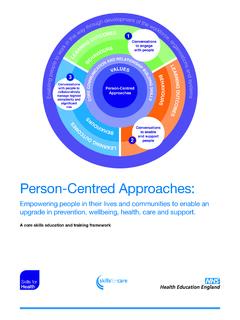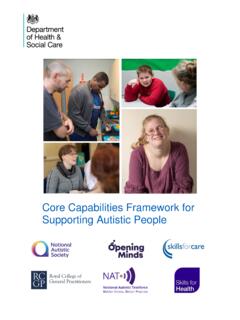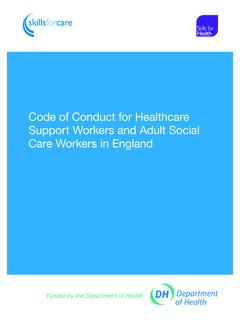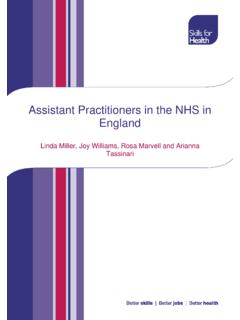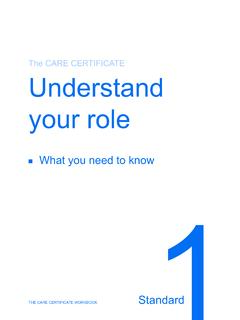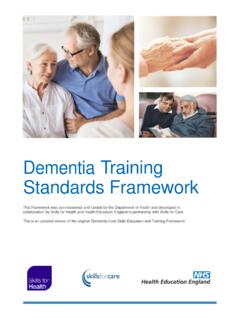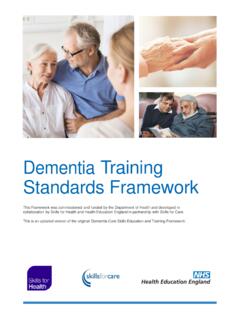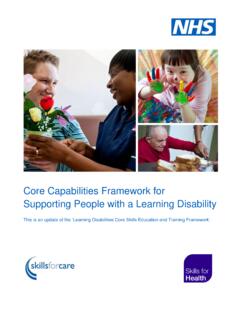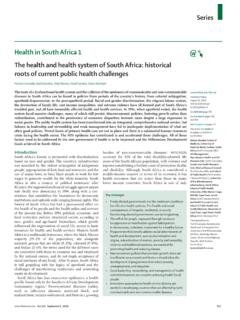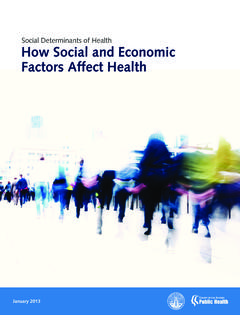Transcription of A core skills education and training ... - Skills for Health
1 1 Person-Centred approaches :Empowering people in their lives and communities to enable an upgrade in prevention, wellbeing, Health , care and core Skills education and training frameworkPerson-CentredApproachesVALUESC ORE COMMUNICATION AND RELATIONSHIP BUILDING SKILLSBEHAVIOURSLEARNING OUTCOMESBEHAVIOURSLEARNING OUTCOMESBEHAVIOURSLEARNING OUTCOMESC onversationsto engagewith peopleConversationsto enableand support people12 Conversationswith people tocollaboratively manage highest complexity and significantrisk3 Enabling people to work in this way through development of the workforce, organisations and systemsAcknowledgementsThis framework was commissioned by Health education England (HEE). Its development was led by Beverley Harden (HEE), with project management provided by Colin Wright ( Skills for Health ) and initial scoping research by Paula Knight ( Skills for Care). The framework was written and compiled by Petrea Fagan, Anya de Iongh, Beverley Harden and Colin thinking for this work began with many valued conversations involving Em Rahman and colleagues within Health education Wessex, alongside local people, public Health , social care, housing, voluntary sector, academic and Health colleagues.
2 Based on the principles of co-production, development of the framework involved the participation of a wide range of stakeholder organisations and representatives of people using Health and care services. The stakeholder list compiled during development of the framework comprised approximately 300 individuals. We are particularly grateful to the members of the project steering group for providing their guidance, expertise and support during the development process and to Suzanne Wood (Improvement Fellow, The Health Foundation) for her guidance during the project. The steering group included representatives of the following organisations: Academic Health Science Network Carers Trust Coalition for Collaborative Care Health education England Leadership Academy Local Government Association London Borough of Barnet National Voices New NHS Alliance NICE NHS England public Health England Race Equality Foundation Royal College of General Practitioners Skills for Care Skills for Health The Health Foundation TLAP (Think Local Act Personal Partnership)In addition, we would like to thank the many other people who provided comments and feedback on drafts of the framework during the project and particularly the 144 respondents to the online consultation survey.
3 Health education England, Skills for Health , and Skill for Care 2017 Copies of this framework may be made for non-commercial purposes to aid workforce development. Any other copying requires the permission of the in 2020 The NHS Long Term Plan sets out the strategic national plan for the NHS over the next ten years. The Long Term Plan describes five major, practical changes to the NHS service model, one of which is:Personalised Care will benefit up to million people by 2024, giving them the same choice and control over their mental and physical Health that they have come to expect in every other aspect of their life. A one-size-fits-all Health and care system simply cannot meet the increasing complexity of people s needs and expectations. Personalised care is based on what matters to people and their individual strengths and needs. shared-decision making personalised care & support planning self-management support social prescribing and community-based approaches personalised Health budgets enabling six core activities are facilitated by a number of enablers, including the workforce, which is directly supported by this Framework and the associated suite of resources.
4 The ambition in the Long Term Plan is for personalised care at scale, so as many people as possible can benefit throughout their lives. This requires a step-change in workforce development around the outcomes described within this terms personalised care and person-centred approaches are used interchangeably throughout these resources. As the quote from Maya Angelou says people will forget what you said, people will forget what you did, but people will never forget how you made them feel . The social movement of person-centred approaches and personalised care will continue to evolve in the future, with its language naturally developing. The core Skills that help people feel connected, engaged, enabled and supported remain consistent, whatever we may call them, and make this Framework highly relevant in today s world of Personalised Care. People will get more control over their own Health , and more personalised care when they need it The approaches that have been brought together to form the new personalised care strategy have previously been referred to as Person-centred care.
5 These approaches encompass a highly relevant range of activities and knowledge. The Skills and competencies needed by the workforce to provide person-centred care are just as relevant and applicable to personalised care and shouldn t be viewed are applied and integrated into the roles of people working across services and sectors such as Health , social care, local authorities and housing, and across different types of organisations ( public , not for profit and private). As described in the introduction of this Framework, much of this approach builds on previous ground breaking work in mental Health and social care over many years, which mirrors the same fundamental values and Skills that underpin person-centred approaches . The phrases are used interchangeably within the system, since they share the same core principles and evidence base. The detail of the current policy for personalised care is contained within the Universal Personalised Care: Implementing the Comprehensive Model.
6 The Comprehensive Model for Personalised Care is an all age, whole population approach, with different components that can support people relevant to their Health and wellbeing. Acknowledging that people s Health and wellbeing change over time, it is the universal and comprehensive provision of the components that builds cumulative benefits for people, their family and carers and communities. The operating model to deliver personalised care defines six core activities that happen across Health and social care services: The knowledge and activities of person-centred approaches that are enabled through this framework include:KnowledgeActivitiesThe core of person-centred approachesKnowledge which may include the following: social determinants of Health Patient activation Quality improvement Technology to support healthand wellbeing Health literacy Accessible InformationStandard Patient and public Involvement(PPI) Awareness of local services andresources Coproduction Asset-based approaches Looking beyond traditionalhealth and care solutions Carer awareness Communities Prevention (primary, secondaryand tertiary) Person-centred measurement& outcomes Statutory and mandatoryregulation and governance Relevant policyThe core of person-centred approaches V alues core communication andrelationship building Skills Conversations to engagewith people Conversations to enable andsupport people Conversation with people tomanage the highest complexity and significant risk Enabling people to work in this way through.
7 Development of the workforce Development of organizationsand systems Supporting behaviour changeActivities which may include the following: Shared decision making social prescribing Care navigation Care coordination Advocacy Supporting self-management Care and support planning Health coaching Motivational interviewing Peer support Recovery Personal budgets/IPC Supporting behaviour change Signposting Advanced Care Planning Making Every Contact Count(MECC) Managing risk Working in partnership atindividual and service level Integration of services acrosssectors Measuring impact at individualand service level4 ContentsForewords ..05 Introduction ..07 About this framework .. communication and relationship building Skills .. 1: Conversations to engage with people .. 2: Conversations to enable and support people .. 3: Conversations with people to collaboratively manage highest complexity and significant risk ..28 Delivery of training , education and learning for embedding a person-centred approach.
8 42 Appendix 1: Communication Skills ..50 Appendix 2: Person centred approaches applied across a range of activities ..52 Appendix 3: Tools to deliver training and development for the workforce ..53 Appendix 4: Glossary of terms ..55 Appendix 5: How the framework was developed ..61 Appendix 6: Current relevant resources ..62 Appendix 7: Reference list ..705 Foreword fromAnya de IonghAs someone living with long-term Health conditions, person-centred approaches matter to me. I ve been lucky to make a shift from being overwhelmed by my Health , to feeling more confident, living well with my conditions, and working to support others with their self-management journeys. This has been a cumulative result of conversations with a range of different people, including peers, professionals, family and friends. From my experience, conversations can make or break us. The person who reassured me by showingthey understood that having to stop myhobbies to manage my physical conditionswould affect my mental Health .
9 The doctor who left me feeling frustratedby listing all the various things I should bedoing to help manage my condition, withoutstopping for a few seconds to acknowledgethe effort I was already putting in. The physiotherapist who gave me confidenceby co-designing an exercise programme withme so that it fitted around the rhythm androutine of my conversations can be too powerful to leave to chance. It shouldn t be by luck that some of us experience the shift to a person-centred approach. This is why I feel this framework is so creation of this framework itself has modelled the principles of person-centred approaches that we talk so much about. I ve been involved as an equal partner to write this document, working closely with Petrea Fagan, Colin Wright and Beverley Harden. I am seen as more than my patient stories, with valued personal and professional expertise and experience to fromClenton Farquharson MBEI am passionate about person-centred approaches , which for me means: Control over the circumstances of my own life.
10 Contact with other people that is meaningfuland encouraging. Confidence to see myself as a strength, to bein a position to take actions and responsibilityand to have a positive impact on those work in the Health and care system I also live with an impairment and long-term Health conditions. If l have learned anything about working in a complex, rapidly changing, Health and social care system, it is that we all depend on each other to get things done. Our quality of life, our happiness, our ability to bounce back when times are tough are directly related to the level we feel connected to others and can rely on them for support. But people don t develop person-centred habits or behaviours just because they go to a workshop. In my experience, it is the ongoing quality of relationships that Health and social care workers know how to connect with me and my family, are able to listen and discover what s really going on beneath the surface, build trust and find ways to explore solutions together, then life outcomes can be transformed.
